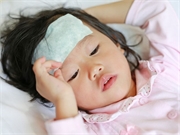- Could Your Grocery Store Meat Be Causing Recurring UTIs?
- Are You Making This Expensive Thermostat Error This Winter?
- Recognizing the Signs of Hypothyroidism
- 10 Strategies to Overcome Insomnia
- Could Artificial Sweeteners Be Aging the Brain Faster?
- Techniques for Soothing Your Nervous System
- Does the Water in Your House Smell Funny? Here’s Why
- Can a Daily Dose of Apple Cider Vinegar Actually Aid Weight Loss?
- 6 Health Beverages That Can Actually Spike Your Blood Sugar
- Treatment Options for Social Anxiety Disorder
Meds May Not Prevent Migraines in Kids

Migraine drugs that might work for adults won’t prevent the debilitating headaches in kids and teens, a new study shows.
A number of drugs are used to prevent migraines, but treatment of youngsters has largely been based on the results of adult studies, the international team of researchers pointed out.
What really works in kids? To find out, the researchers reviewed 23 studies conducted between 1967 and 2018. In total, these studies included more than 2,200 young patients.
About one-quarter of these patients received an inactive placebo, while the remainder were treated with a range of drugs (antiepileptics, antidepressants, calcium channel blockers, blood pressure drugs) or food supplements.
None of the medications were more effective than placebo in the long term (five to six months or longer), and only two — propranolol and topiramate — provided benefits in the short term (less than 5 months), according to the study published online Feb. 10 in JAMA Pediatrics.
The bottom line, according to researcher Cosima Locher: “The preventive pharmacological treatment of pediatric migraine with all these drugs is barely more effective than placebo.” Locher is with the faculty of psychology at the University of Basel, in Switzerland.
The findings highlight the need for more research into migraine prevention in children and teens, and into the power of the “placebo effect” specifically in these patients, the researchers said.
The results might also point the way to new methods of migraine treatment in children and teens that take into account the expectations of patients and their relationships with their doctors. It’s possible that this approach could boost the effects of medication or even help treat migraines without the use of drugs, Locher said in a university news release.
Two experts in the United States agreed that drug therapy might not always work best for kids battling migraine.
In fact, one major recent study showed that “behavioral intervention may be as effective in children as pharmaceuticals, yet is significantly underutilized,” said Dr. Noah Rosen, who directs the Northwell Health Headache Center in Great Neck, N.Y. “As this analysis shows, much more work needs to be done to show true value in the medical management of pediatric headaches,” he added.
Dr. Yili Huang directs the Pain Management Center at Phelps Hospital in Sleepy Hollow, N.Y. He agreed that “lumping adults and children together in treating migraine is problematic because adult and pediatric migraines can be very different. For example, in children, the pain is usually felt on both sides of the head, compared to only one side in adults.”
And Huang stressed that drugs aimed at preventing migraines do come with side effects, including mood changes in kids. “In some cases, the potential side effects outweigh the unclear benefits of preventing migraines with these medications,” he said.
In his opinion, “non-medication treatments should be the backbone of prevention for children who suffer with migraines.” This includes changes in lifestyle, including “healthy drinking, eating, sleeping, and exercise routines,” Huang said.
“In some children, psychological treatment such as biofeedback techniques have been demonstrated to be helpful,” he added. “These treatments can be effective and are not associated with the potential side effects of medication treatment.”
More information
The American Academy of Family Physicians has more on migraines.
Source: HealthDay
Copyright © 2026 HealthDay. All rights reserved.










